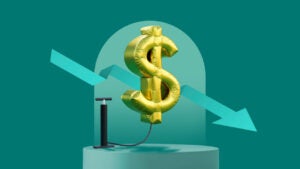5 best investments that hedge against inflation, and others to avoid

Investors remain worried about how inflation could impact their portfolios. While inflation has come down off its multi-decade highs, it remains elevated, despite the efforts of the Federal Reserve to rein it in. New tariffs from the Trump administration threaten to push prices higher for some goods yet again, so it might still be a good time to evaluate your portfolio and decide if adding some inflation hedges makes sense for you.
Here are five of the best inflation hedges to help protect your portfolio against inflation, and two areas that you want to avoid if you think we’re in for a period of sustained inflation.
5 ways investors can stay protected against inflation
A potent cocktail of trillions of dollars of government stimulus, near-zero interest rates and supply constraints helped push inflation to 40-year highs in 2022. While the Fed’s work, inflation still remains stubbornly higher than the 2 percent target three years later and may be here for longer than many expect.
If you expect inflation to persist, it can actually be a good time to be a borrower, if you can avoid being directly exposed to that inflation. The reason? If you borrow at a fixed interest rate, you’re effectively repaying your debt with cheaper dollars in the future. It can get even better if you’re using certain types of debt to invest in assets that are likely to appreciate over time, such as real estate.
Here are some top inflation hedges that may help you mitigate the impact of inflation.
If you’re looking for expert guidance when it comes to managing your investments or planning for retirement, Bankrate’s AdvisorMatch can connect you to a CFP® professional to help you achieve your financial goals.
1. TIPS
TIPS, or Treasury inflation-protected securities, are a useful way to protect your investment in government bonds if you expect inflation to stay high or speed up. These U.S. government bonds are indexed to inflation, so if inflation moves up (or down), the effective interest rate paid on TIPS will too.
TIPS bonds pay interest every six months, and they’re issued in maturities of five, 10 and 30 years. Because they’re backed by the U.S. federal government (like other government debt), they’re considered among the safest investments in the world.
2. Floating-rate bonds
Bonds usually offer a fixed payment for the life of the bond, meaning bonds have their broad side exposed to rises in inflation. One way to mitigate that effect, however, is with a floating-rate bond, where the payout rises in response to upticks in interest rates caused by rising inflation.
One way to buy these is through bond ETFs or mutual funds, which typically own a wide assortment of such bonds. So, in addition to inflation protection, you’ll also get some diversification, meaning your portfolio may benefit from lower risk.
One type of floating-rate bond that’s backed by the government is called the Series I bond, so you get inflation protection as well as the safety of U.S. government debt.
Investors can turn to the best brokers for ETFs or the best brokers for mutual funds, but those looking at Series I bonds will need to go straight to TreasuryDirect.
3. A house
You might not think of a house as a good way to hedge against inflation, but if you use a mortgage to buy your house, it can be an excellent way to do so. With a long-term mortgage, you’ll lock in funding for up to three decades and can even refinance if rates go lower.
A fixed-rate mortgage allows you to maintain the biggest portion of housing expenses at the same payment. Sure, property taxes will rise and other expenses may creep up, but your monthly housing payment remains the same. That’s certainly not the case if you’re renting.
And, of course, by owning a home you’ll have the potential for its value to increase over time. If more money is flooding the market, you can get price appreciation, too. Another potential benefit: You may be able to deduct your interest expense from your taxable income.
4. Stocks
Stocks are a good long-term vehicle for hedging against inflation, even if they may get hit by anxious investors in the short term as their worries rise. But not all stocks are equally good inflation hedges. You’ll want to look for companies that have pricing power, so that as their own costs rise, they can raise prices on their customers. This pricing power helps them continue to grow profits amid inflation.
And as a company’s profits grow over time, its stock price should climb. While the stock market might get hit by worries of inflation, the best companies power through it with their better economics. Stick with a well-diversified portfolio, or go with an S&P 500 index fund, for potentially long-term attractive returns that beat out inflation.
5. Gold
Gold has traditionally been a safe-haven asset for investors when inflation revs up or interest rates are very low. Gold tends to fare well when real interest rates – that is, the reported rate of interest minus the inflation rate — go into negative territory. Investors often view gold as a store of value during tough economic times, and it has succeeded in this purpose over long periods.
One good option for investing in gold is to buy it through a top gold ETF, so you won’t have to actually own and protect the gold yourself. Plus, you have several options with ETFs, allowing you to own physical gold or the stocks of gold miners, which can offer higher upside if gold prices soar.
Is there a way for investors to take advantage of rising prices?
An inflationary environment isn’t terrible for everyone. Some businesses do better when prices are rising. Banks typically earn more money as interest rates rise and they are able to profit off a wider spread on what they charge for loans compared to what they pay out for deposits.
Companies with low capital needs and the ability to raise prices are often the best positioned during inflationary times. These businesses can maintain and increase their earnings power without having to reinvest large amounts of money at ever-higher prices.
Legendary investor Warren Buffett once said that an unregulated toll bridge would be his favorite thing to own in an inflationary world because you would have already built the bridge and could raise prices to offset inflation. “You build the bridge in old dollars and you don’t have to keep replacing it,” he said.
Inflation can hit both of these asset types hard
1. Long-dated bonds
Long-term bonds can be absolutely destroyed if inflation picks up and investors expect it to stick around for years. The reason is simple: If inflation rises above the bond’s interest rate, you’re losing purchasing power over time. So a long-dated bond’s price will drop to compensate for this. The longer the bond’s maturity, the more sensitive its price is to a change in inflation.
One of the longest maturities is 30-year Treasury bonds, and it can move drastically in response to changes in rates. If you own it and interest rates rise, you’ll be hit with an immediate loss to your principal. At the bond’s maturity, you’ll be able to receive all your principal, but you may have to suffer through decades of being underwater on your investment.
Short-term bonds — those that mature in less than a couple years — will feel small effects from a modest upturn in inflation.
2. Long-dated fixed-rate CDs
Like long-dated bonds, long-dated fixed-rate CDs lose their attractiveness if inflation rises. Because the value of a CD’s fixed interest rate can be eroded significantly by inflation, you’ll lose purchasing power over time. Unlike long-dated bonds, however, the principal value of your investment won’t decline, but it may cost you a penalty to break the CD, if you do so.
If you like the safety of bank-backed CDs, one alternative could be inflation-protected CDs, which adjust their effective interest rate up or down in response to changes in inflation.
Bottom line
Inflation is a big concern for investors right now, and investors are waiting to see if the Fed can finally get a full grip on rising prices. Regardless, it makes sense for consumers to think about how inflation may affect their portfolio and make smart, low-cost moves that improve their financial future.
Note: Bankrate’s Brian Baker also contributed to an update of this story.
Editorial Disclaimer: All investors are advised to conduct their own independent research into investment strategies before making an investment decision. In addition, investors are advised that past investment product performance is no guarantee of future price appreciation.
Why we ask for feedback Your feedback helps us improve our content and services. It takes less than a minute to complete.
Your responses are anonymous and will only be used for improving our website.






